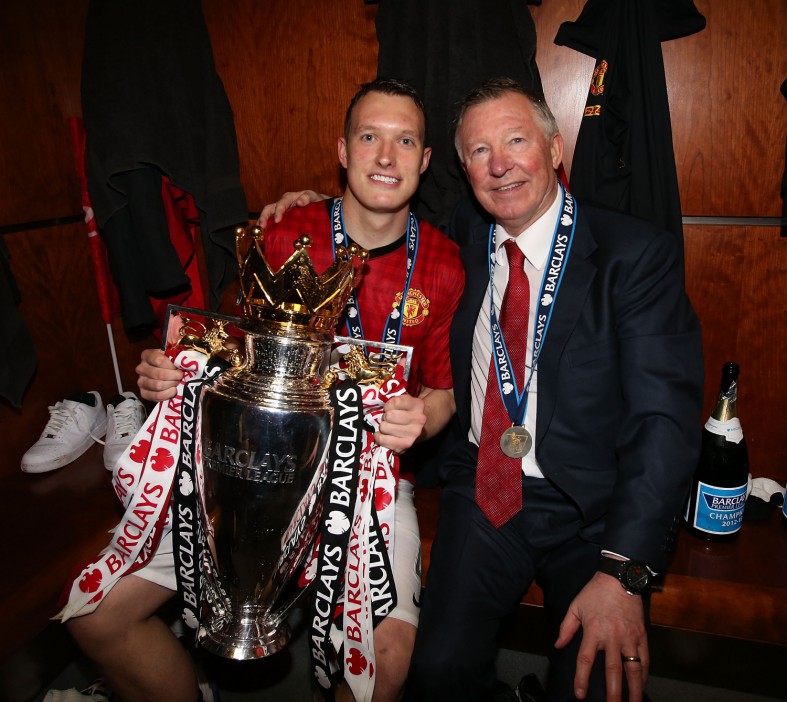
PHIL JONES lifted the lid on years of abuse and mental anguish he suffered at the hands of vile trolls.
And the former Manchester United and England defender revealed he was only able to overcome the torment with help from a psychologist and a therapist.
Jones, 32, who retired last month, avoided the public, rarely went to restaurants and dodged speaking to team-mates.
All the while, fans who abused him were unaware of the true extent of his 14-year injury battle.
Opening up about his struggles, Jones confessed that when he did play, the agony of his wrecked right knee was regularly numbed by painkillers and steroids.
And while he was struggling physically, there was also a mental toll.
He said: “I’d been through that much trauma mentally.”
Jones first tore his meniscus as an 18-year-old at Blackburn and, although Sir Alex Ferguson signed him for United, it was the beginning of his injury nightmare.
As the injury absences became longer, Jones became the subject of horrific abuse and ridicule both online and face to face in the street.
Asked if it affected him, he said: “Anybody who tells you that it doesn’t is lying. And as footballers you have to put this mask on.
“You get paid a lot of money so you are not allowed to have feelings or emotions.
“The physical injuries made me mentally weak at times.
“Obviously people will ask, ‘he is always injured?’ as though they think that I wake up one day and think, ‘oh, yeah, I fancy being injured today’.
“But my coping mechanism was to be silent, put my guard up, my shield up around with my really close family.
“I wouldn’t even really communicate with my friends that well.”
Jones said he tried to stay off social media but his friends would fill him in.
He said: “You’d go past people in the street and they’d say something and it would really aggravate you and get to you.
“You just hear people whispering, ‘Oh there he is, f**king injury-prone’. People say, ‘you shouldn’t take that money then’.
“As footballers you have to put this mask on
Phil Jones
“If they only knew what I was doing behind the scenes to get right.
“Flip that on its head and say, ‘I’ll tell you what then, what I’ll do is I’ll take the money away from you and see if you go back into work’. Everybody’s got to earn money.
“I found it really hard to go to restaurants for years. You put your head down when you’re walking through crowds and stuff. I didn’t want people to spot me.”
Following surgery at Blackburn, Jones appeared to have recovered but his knee went again, a year after his move to Old Trafford and surgeons had to remove the meniscus.
Again he fought back but eventually having to play with bone rubbing on bone took its toll.
Although he never fully recovered, Jones said he “left no stone unturned” to carry on playing.
Speaking to the High Performance podcast released this week, Jones said: “My knee would swell.
“I’d be on compression boots, I’d be on the ice, I’d be in the pool, recovery, trying to get every inflammation down.
“I would start getting really, really sharp pains every time I passed the ball. Incredible amount of pain.
“When I look back now I think ‘wow’, I give myself a pat on the back for getting through those periods.
“Players and staff knew I had a bad knee but I hid it really well.”
Despite taking strong pain medication, Jones revealed the team doctor would eventually have to inject his knee before games.
After years seeing surgeons and specialists, Jones said he spent more time on the treatment table than a pitch.
He started deliberately coming in late for physio to avoid well-meaning team-mates constantly asking how his knee was.
And his anguish began affecting his family life.
He even wanted his wife, Kaya, to remove a display of England caps — Jones played 27 times for his country — and a Premier League-winners trophy because he felt “worthless”.
But eventually, and partly for the sake of his daughters, Jones realised he had to “deal with it”.
Jones also came to accept that his playing days were over.
He added: “It was a relief off my shoulders that I didn’t have to put myself through this pain.”
United released him in the summer of 2023, a year after his final appearance in a 3-0 Premier League win over Brentford.
But after helping coach Red Devils’ youngsters, he is setting his sights on coaching or management.
He says: “I’m looking forward to the future and I’m positive about it.”
WHERE TO GET HELP YOU NEED
IF you are ever worried that someone’s life is in immediate danger, call 999 or go directly to the emergency services.
For anyone in crisis, struggling to cope or needing immediate help, use the Shout Crisis text line (text 85258) or The Samaritans (call 116 123) – which are both available 24/7, 365 days a year.
CALM offer a confidential helpline (0800 585858) and livechat, both available from 5pm to midnight.
Visit nhs.uk/mental-health/ to find NHS mental health support near you, and how to self-refer for talking therapies, such as CBT and counselling for mental health conditions including depression, anxiety, panic, OCD and more.
Visit the Movember website for more advice on men’s health and recommended support groups, organisations and charities.
Movember Conversations is an online tool that helps you practise difficult conversations with pretend scenarios.









